Bruz Fletcher Project: Remembering A Gay Voice | ||
Songs of Bruz Fletcher | ||
with Glossary* & Commentary The Origins of Drunk with Love: Jimmie Reynard & Queenie Smith | ||
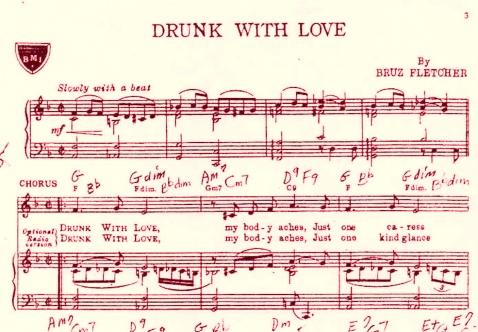 | ||||
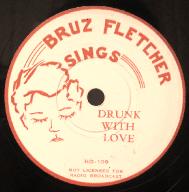 | ||||
Sheet Music collected to unrecorded songs: Queenie, Dream Girl Song, She Meant to Go Right and Went Wrong, New York Man, Where Are You, Bad Girl, Things I Bring from Paris to You, Casting Room Rose, The Golden Girl, I'm Madly in Love (with the Ice Man), The Boardwalk Blues. Other Sheet Music collected: Drunk with Love, Spring in Manhattan, It, Hello Darling. Lost Songs: Cocaine, Night Flight to Reno. | ||
Complete lyrics to the songs excerpted below and others can be found in the book.
Drunk with Love
I'm drunk, drunk with love. My body aches. Just one shot that’s all it takes to make me cry and tell you why I’m drunk, dead drunk with love.
Rotten liquor, mostly gin, every club I stumble in, round and round because I've found she likes me drunk with love.
Introduced by Queenie Smith (see bottom of page)
Recordings: 2 times by Bruz Fletcher, 4 times by Frances Faye (plus 1 live private recording) and once each by: drag king Miss Jimmie Reynard (aka Miss Jimmy Reynard - see below), Joyce Bryant, Pearl Bailey, Wilbur Stump, Terese Genecco, black tar herion (aka Marlene Bellissimo), and Bad Mouse Orchestra.
Performed in Faye tribute shows and solo cabaret by both Terese Genecco and Nick Christo; also included in two 2016 theatrical shows. In 2019 the song became a part of the repetoire of Bad Mouse Orchestra.
She's My Most Intimate Friend Recorded 2 times by Bruz Fletcher
She's my most intimate friend. And naturally, I shan’t say a word. It doesn’t make a bit difference to me what the papers have printed and what anyone’s heard. I like her.
Of course I don’t entirely approve of her killing her husband, but never-the-less, he was the logical person for her to kill. And she did do it nicely, we all must confess.
And dope. Lord, she has stuck herself with that needle. So many holes front and back, if she had any inner radiance she’d be a living tower of jewels. It’s a shame for the tourists that her soul is so black. I like her.
Hear these songs at Queer Music Heritage
The Hellish Mrs. Haskell Recorded 2 times by Bruz Fletcher
I’ve hair on my head not a wig for a crown which reminds me, Mrs. Smith’s should be darker. You’ve called me a bust and I’m quite proud of that for its my bust no rubber affair, look at Sue, the fat lummox, hers has slipped to her stomach, though no man on earth would care. Don’t give me that hauteur, Lady Grey, your own daughter made a fine Junior League and with joy (*) I can point out the dwelling where she got rid of the swelling and your son, Mrs. King, was the boy.”
Heard a new one, Mrs Truman? About your young upstairs maid, that colossel old fossil, your husband’s not docile; the upstairs beds are not all that she made. And your trips to New York, Mrs Russell, changed the name of an airline, no less. They put a “T” on the end of TWA. What the pilots must think I can’t guess.”...
My Doctor
Once upon his table never yet has one been able to say “no” to any treatment he’ll suggest. His smile is so contagious and his fee is so outrageous that the size of it assures you of the best.
He’ll stick you with a needle, just like that oh, very quick; which the weakly call the very neatest trick. The size of his prescription quite belies human description He’s just as well for well as well for sick
My doctor, his understanding really is huge- tree-mendous. My doctor, he keeps his nurse as merely a stooge. His work is more first than last rate. The ladies take it at a fast rate; and every man would like to cast ass-pursions on my doctor.
Mrs. Lichtenfall
Lathe was frantic. He the major-domo, (*) he the masterful, the beautiful. Only three knew that he was homo! Oh what, oh god, what was he to give her - that vulgarian of dowager, who now insisted he deliver.
39 steps he counted as he mounted to her room that frilly little chamber oh so soon to be his tomb. He opened the door and faltered, “I can’t,” he said “I’m not...” Mrs. Lichtenfall looked at him, smiled at him, felt of him. Shot.
Wide Open Spaces (aka The Prairie)
I’ve been rounded up aplenty, ask my buddies Casey and Lee. (*) I’ve had grass stuck up my - coat scampering from the wild coyot’. Now I’m back again where I should be, back in the dirt and dust of the city. yadee dah yadah dee
ho dee ho I can make that cowboy yell “yippee” just by ringing up a "belle," (*) here in the dear old city.
Give me the noise, joys, boys, of the city. Give me the slickers, lickers, tickers, stock and clock. Give me men quite not so vagrant and most certainly more fragrant. Give me the dear old city.
Any turkey that is superior loves it stuck in its posterior but apperance not withstanding I am no bird. (*)
I’ve tramped, I‘ve“camped,” ha, I’ve introduced a different brand. (*) The grrreat divide all on my side, means more to me now than just a crack in the land. “...Where the deer and the antelope,” can take it. Give me a penthouse instead of a tenthouse and give me a bathroom. Give me Chanel and to hell with the fellow who smells of the range. Give me beautiful faces and practical graces, and show me the man who likes wide open spaces. Get along, little doggie, get along...
Keep an Eye on His Business
The psychology of a New York lady on how to hold a man. Now Miss Harlow says to hold your man you must give him attention, (* - see Glossary below)
You just keep an eye on his business that’s all a girl has to do. Tell him you know when the market is low and he will worship you. They’ll come a day when you’ll try something new, help him to put the thing through; and you’ll not find a man who won’t give you all he can if his business interests you.
So, after all, a man’s business is the thing that provides you with a well filled larder. Don’t peck, and don’t pull, don’t squeeze and don’t back him up against the wall. When things go well, let him know that you are as pleased as he. And if some ass-et seems more compatible, remember that your husband has a secretary and she probably knows his true feeling even better than you do and can put her finger on it the minute you turn him away.
A man with a big business and a man with a small business are both trying to make the most of what they own. Share, Ladies, give; don’t expect him to do everything. Put a hand on the tiller yourselves and push forward. (* - see Glossary below)
From The Nympho Dipso Ego Maniac
...She's a complex, reflex, multi-sexsation. When your done, she's only begun. She's not im- she's just un-moral and she hates a lei that's floral who doesn't - those stinking weeds. She'll never give up, give out or give in; she's the Cinderella of sin now.
The preacher said he'd teach her, but she taught him for a feature of a rainy Sunday afternoon in May. Then she got him so excited that that evening he delighted with sermon on Gomorrah, very gay.
Then a female delegation from a little congregation thought they'd call her up to call her down, and so she met them with a bevy of some sailors from the levy and the sailors laid the ladies very low - and did they love it.
She was good for all divorces, served her sex in 7 courses. Used her whips on every thing but horses' wristsss. Though her family stock was Quakery and she'd never seen a bakery, she was one young girl who really knew her twistsss.
Just a Nympho Dipso Ego Maniac...
Oh, For a Week in the Country
...Egged on by our friends - the rats- who at midnight wave goodbye we leave the sane and sanitary saloon and gaily cry:
On the green sward a 'daisy chain' we’ll make. (* - see Glossary below) Just as a mean store learning more, if we can, about each brother man
Oh, for a week primeval with a bag to sleep in and not on. With a hamper of goodies we’ll scamper thru woodies. Oh, for a week as a faun."
With bright green tile they’ve lined the swimming hole and the skunks all smell of tweed. The birds all sing songs by Cole and Noel, (*) we were there with the Hammond organ playing the accompaniment they need.
From Miss Day
...The show must go on I have found: action, camera, sound. I owe so much to you people out here, which reminds me, send mother my check for this year - my bonus for living in this god-awful waste where the flowers don’t smell and the fruit has no taste; where everyone’s nearly as stupid as I but oh so very few get a break and can die.
From The Garden City Belle
...My methods may not be as ethical as those of other misses but they have broken hearts and I have diamonds for my kisses I’ve a business all my own and what I sell, and I sell plenty, makes me the Garden City Belle.
Now at the time when I was in my glory, and my name was up in lights men were men, I’m telling you, and the things they used to do kept us poor defenseless women lookin’ sights. It took ice bags nearly every morning and corsets hourglass in shape to keep us well and trim from those they men had well, uh ... dim and a buggy ride meant kisses, no escape.
No lady who was worthy of the name would tantalize a man. We gave as well as took, got an escort with a look and were quite prepared to end what we began - maybe that is why I am the rage of Garden City.
GLOSSARY:
"Any turkey..." and “Where the deer and the antelope, can take it": Double entendres for anal sex. "grrreat divide...," and "man who likes wide open spaces" are more examples of the same.
Barn: Stuart Timmons writes: the Barn was a Hollywood gay bar in the early 30s, so all those jokes about the cocktail bar there the pump oncewas, jugs bands that swing, etc. might mean "the Barn;" from what I've found, this was one of the earliest gay places in Hollywood, likely from his late 20s days. On the other hand, there's strong suggestion this was outside LA -- I thought for a moment it might mean San Simeon. (Marion Davies was "known friend of the boys" so it's likely he'd have been in her circle.)
Belle: is an old term for a cute young gay guy. This makes me think that part of what he is talking about is trade -- which was more common back then, according to Stuart. From a 1937 Howard Greer letter: "...my little villa was thronged with belles. (I'd very carefully asked no women!)"
B-girl: A woman employed by a bar to encourage customers to spend money freely or to act as a companion to male customers.
Bullock’s Wilshire: LA landmark department store built in 1929.
Camp: term used to mean homosexual in the way that "gay" is used today. It also meant silly and over the top as it still does today. Double entendres for "tramped" -slept around, and "introduced a different brand" -bisexuality.
Chateau Elysee: Hollywood’s first residence hotel, home to many stars.
Chic Sale: (pronounced chick) a term widely used in the 20's & 30's meaning an outhouse named after a popular mid western humorist/author/vaudevillian of the same name.
Clip Joint: A restaurant, nightclub, or other business where customers are regularly overcharged. A place of entertainment where high prices are charged for poor entertainment.
Daisy Chain: a link of lovers. Hymie goes with Shirley, Shirley goes with Pearly, etc. It can also be is a line of people joined end to end (or front to back) in sexual union.
Georgian Crosses: Saint Nino (or Nina) is the patron saint of the country of Georgia. She made a cross of vine branches. This gave the Georgian crosses their slightly hanging arms. From a culture with a rich history of metal work, the crosses can be iron, bronze or precious metals.
Junior League: an organization of women committed to promoting voluntarism founded in 1901. Its purpose is exclusively educational and charitable.
Lalique: highend collectible glassware. Georgia adds, double entendre = take a leak / "la" leak.
Lee: possible reference to Lee Riders, a heavyweight jean for cowboys, introduced by the H.D. Lee Company in 1924 and rodeo sponser in the 30’s. Or "Casey" may refer set decorator Casey Roberts who worked with, traveled with, lived with and drew Bruz, a long-time lover. Lee could be friend Gypsy Rose Lee.
Mayo Bros: The Mayo Clinic evolved from the frontier practice father and his two sons, William and Charles Mayo. In 1889 they opened a hospital in Minnesota and developed a revolutionary new group approach to practicing medicine.
Major-domo: butler or head butler.
Miss Harlow says to hold your man: Jean Harlow starred in "Hold Your Man" in 1933.
Noel and Cole: Noel Coward and Cole Porter.
Summer Stock: a theater that generally produces multiple plays each summer with the same cast. The name combines the seasonal aspect with a tradition of reusing "stock" scenery and costumes. Ham = overacting, Laid an egg = a poorly received joke or performance.
Tiller: bar that steers the rudder in a small boat.
The Vendome: was a Hollywood restaurant owned by Hollywood Reporter owner Billy Wilkerson frequented by stars and the smart set according to Stuart.
Wildwood Days: refers the song 'Memories' written by Gus Kahn and Egbert Van Alstyne: “Childhood days, Wildwood days/Among the birds and the bees/You left me alone/With a dream all my own/In my beautiful memories.” | ||||||||||||
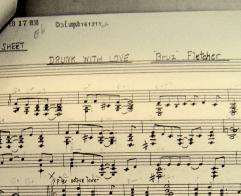 | ||||||||||||
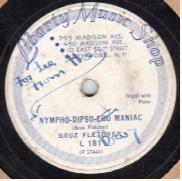 | ||||||||||||
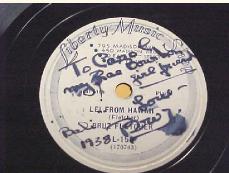 | ||||||||||||
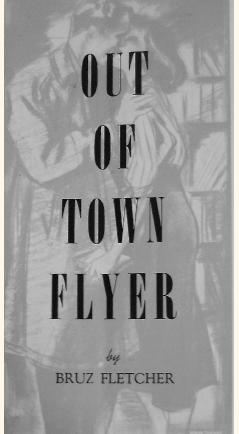 | ||||||||||||
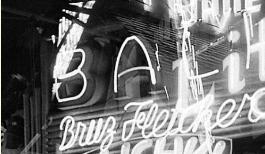 | ||||||||||||
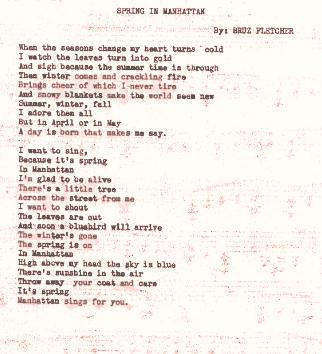 | ||||
Get It Up Kitty
| ||||
| ||
. . From Hello Darling!
There’s nothing so gay as a stinking café A club where the night lights rally There’s nothing so vicious or costly pernicious As the life we all lead in the alley
For birthdays and weddings and airing our beddings The home is no longer a boon A private pleasure or vex we now make public as sex The salon of today’s the saloon
From The Simple Things of Life
I want a cozy little nest, somewhere in the West Where the best of all the worst will always be I want an expensive extensive excursion To the realms of in, per, and di version * It’s the simple things in life for me
* Invert and Pervert were used by the mainstream to mean homosexual.
. . . . From Stuart Timmons' November 2006 article in The Gay and Lesbian Review Worldwide:
A key to Fletcher’s surge as a celebrity was his ability to appeal to multiple audiences by creating characters and exchanges between them that could be read officially as heterosexual “blue humor,” but the girls could easily be boys beneath, especially in an era when gay men often considered each other “sisters” and when drag names abounded. “Get It Up Kitty” presents an attractive waif whose manipulative “faking and taking” resonate to gay men of any era. Fletcher’s narrator rejects Kitty’s offer to be his “sister,” lamenting, “I’ve relatives galore, what I’m looking for’s a – more or less undressed company,” and concluding with the order to “get it up and keep it up Kitty.” Fletcher also waxes lyrical about another type of sister – the gay male pal whose adventures, real or imagined, serve to enliven one’s own life. The subject of “She’s My Most Intimate Friend” (1937) he describes thus: “I know she’s diseased; I know she’s insane. I know she can only be appeased with a lash and champagne.” The above-referenced Nympho-Dipso-Ego Maniac, too is a creature as easily bad gay boy as bad straight girl. “Nobody’s sister, nobody’s mother,” Fletcher trills, “just a gal about town.” This casual cleverness resembles an updated riddle of the Sphinx: A sexually ravenous woman who is sister and mother to no one is no woman at all, but a man in drag. The Maniac seduces a well-meaning preacher who, as a result, delivers “a sermon on Gomorrah, very gay.” Though such references may seem thuddingly obvious today, in the 1930s such language raised just the right eyebrows and flew over most heads.
For those who watch ‘30s movies and wonder about the true leanings of the witty fellows in tuxedos, Bruz Fletcher testifies to an undeniable queer streak within Hollywood’s imagination. In “Wide Open Spaces” (1937) seemingly a satire on Cole Porter’s “Don’t Fence Me In,” he pays homage to sodomy on the rough frontier (“where the deer and the antelope can take it”) then renounces it in favor of refined urban sodomy, extolling “the great divide all on my side”:
Give me men quite not so vagrant and most certainly more fragrant…. Give me a penthouse instead of a tent-house and give me a bathroom. Give me Chanel and to hell with the fellow who smells of the range. Give me beautiful faces and practical graces And show me the man who likes wide-open spaces…
He lampoons the sexual maneuverings of sexuality in high society straights in “The Hellish Mrs. Haskell” and “Mrs. Litchenfall,” who tried to seduce a thieving butler who “only three knew was homo.”
With his sweet singing voice, Fletcher could pull his intonations like taffy, camping, vamping, and, in the argot of his day, dropping hairpins everywhere. Fletcher sighs, shudders, and cackles when performing “My Doctor” (1934), a phallic rhapsody about a personal physician who has “the biggest prrractice in town”; to drive the point home, he adds, “the size of his prescription quite belies human description.” A similar song, “Keep an Eye on his Business,” offers pointers on how to literally hold a man, Fletcher makes it clear that he is talking about more than stocks rising; and every time he says “ladies,” one knows that, depending on the audience, he often meant “gentlemen.” | ||
Miss Jimmie Reynard's rare recording of Fletcher anthem Drunk with Love. The first version with same-sex lyrics. And her signature song Tonight We Love. | ||
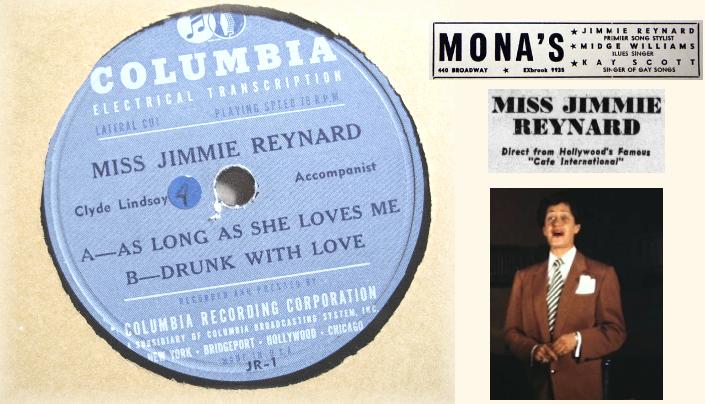 | ||
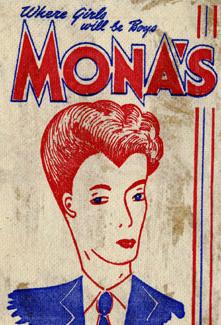 | ||||||
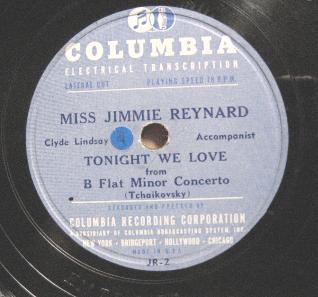 | ||||||
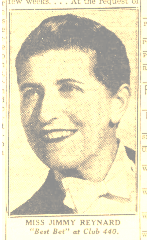 | ||||||
This is the only known recording and only known existent copy of the recording by once popular 1940s balladeer drag king Miss Jimmie Reynard aka Miss Jimmy Reynard. A glimpse of her performing with inaudible sound circa 1950 can be seen in the rare film Mona's Candle Light. Though they were initially a historic curiosity to me, I have come to be charmed by Reynard's interpretations of these 3 songs. . Listening to then is like a time machine that whisks me back to that place and environment. I can imagine the crowd responding to the emotional and heartfelt performance that helped create the ambiance of the bar. They delight me. 'As Long as She Loves Me' appears to be a unique recording. I can find no evidence of this song or its frank lyircs anywhere. See Page 1 for more about the history of "Drunk with Love" and Bruz Fletcher.
From Stuart Timmons and Lillian Faderman's book: .GAY L.A.: A HISTORY OF SEXUAL OUTLAWS, POWER POLITICS, AND LIPSTICK LESBIANS posted at from http://www.girlfriendsmag.com/cover.html: In Los Angeles before World War II there were only a few places that catered primarily to lesbians... They included Jane Jones' and Tess's (called in its various iterations Tess's Continental and Tess's Café Internationale)... Tess's was owned by Tess—a woman who dressed in basic black, pearls, and a great deal of makeup—and her partner Sylvia—who looked like Radclyffe Hall and always carried a long cigarette holder. Both Tess's and Jane Jones' featured male impersonators such as Tommy Williams and Jimmy Renard (sic)—tall, broad-shouldered women singers who wore tuxes and bow ties and had tenor voices. Gay women who frequented those nightclubs still remember Jimmy Renard's (sic) rendition of "Tonight We Love"... * Research note: Most books such as Gay LA and Wide Open Town also use the spelling 'Renard' without the 'y'.
"Slack clad gal" Reynard, billed as "S. F.'s Favorite Singer and Premier Song Stylist" and "a voice you won't forget," was booked in San Francisco quite frequently from 1942 to 1946 at Mona's or Mona's 440 club, several times sharing the bill Gladys Bentley over the years. She was often Mistress of Cermonies for the evening presenting all the various acts. Every so often Reynard would take a 6 month break from performing due to a punctured lung suffered in a 1930 plane crash. Mona's Candle Light operated accross the street from the former Mona's at 473 Broadway from 1948 - 1957. The film of the same name proves Reynard also perforned there in the role of MC.
Roberta Bobba describing entertainers at Mona's, "...with the exception of one, they all wore men's clothes. They wore tuxedos, as a matter of fact. [Jimmy Reynard was the headliner.] She was very handsome – maybe it was the tuxedo – and sang ballads and the whole house was in love with her all the time." - from "Oral History Interview with Roberta Bobba: Voices of the Oral History Project of GLHSNC."
Pat Bond's oral history preserved at the SF GLBT Historical Society tells more about the entertainment at Mona's and other SF landmark lesbian bars of the era, "...and then another one I like a lot—[which] we all liked--was She Likes me Drunk With Love." Jimmy Reynard recorded it and must have performed it too with these same sex lyrics.
From Against the Current, Coming Out in the 40's Beverly Hickok's 2003 autobiographical novel which described an evening at Tess's (Tessie's) Cafe Internationale: ...She was tall with broad shoulders, very masculine, had short brown wavy hair and regular features, and wore a tailored suit and tie. Jan thought she resembled Clark Gable - without the moustache, of course. "Quiet everyone," someone cried, "Jimmy's going to sing." Jimmy had a trained tenor voice and was at her best with senitmental ballads. The girls requested "Tonight We Love," and after Jimmy sang it, Jan knew she would never hear that song again without thinking of her." pg. 50
Ads show Reynard performing for a long run at Tess's in 1942 and in NYC in 1948 at Club How-Do. In 2020, Bad Mouse Orchestra released a CD that pays tribute to Reynard's verison of Tonight We Love and includes 3 Fletcher tunes including the never before recorded I'm Madly In Love with the Iceman. For an excellent and really only comprehensive history of American Drag Kings see JD Doyle's Queer Music Heritage. | |||||||||||||
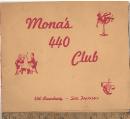 | |||||||||||||
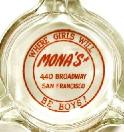 | |||||||||||||
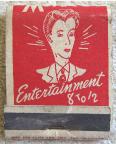 | |||||||||||||
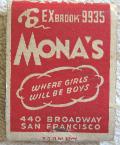 | |||||||||||||
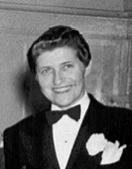 | |||||||||||||
1945 from the GLBT Historical Society Collection | |||||||||||||
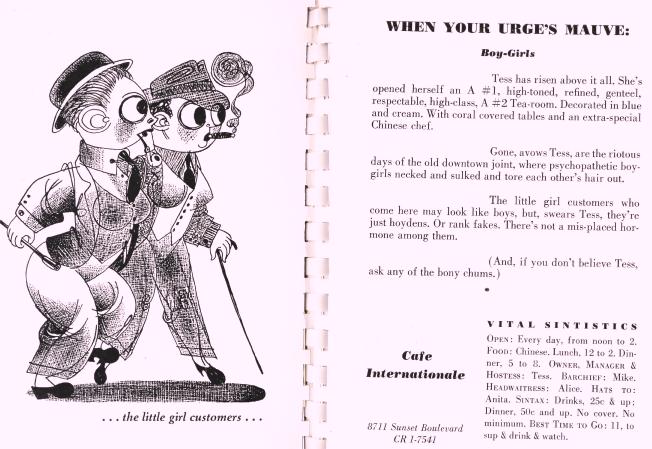 | ||
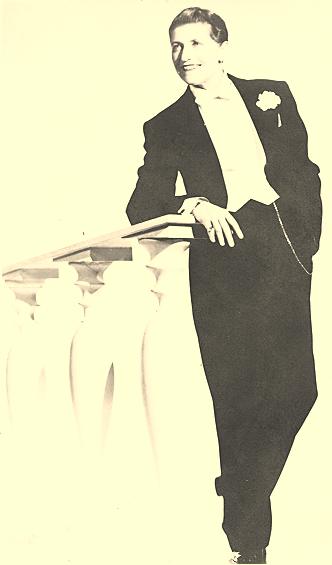 | ||||
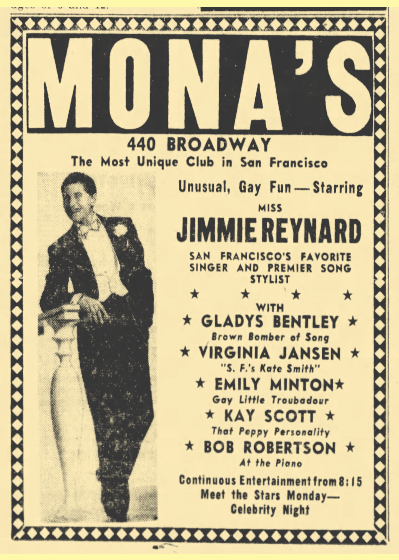 | ||||
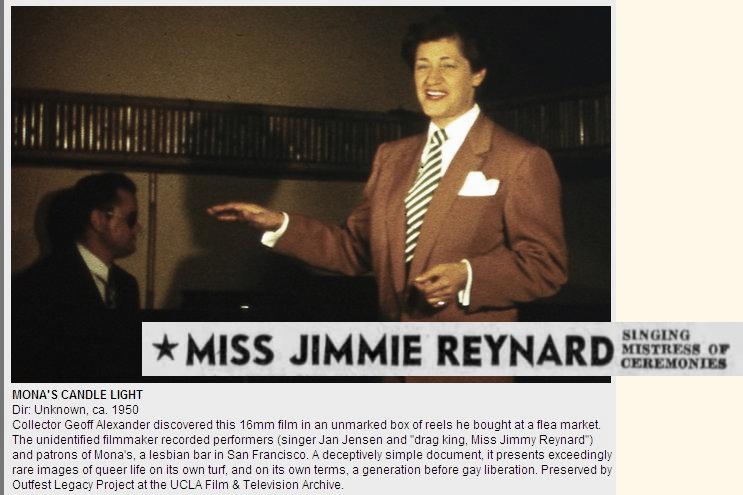 | ||
Queenie Smith and the origin of Drunk with Love | ||
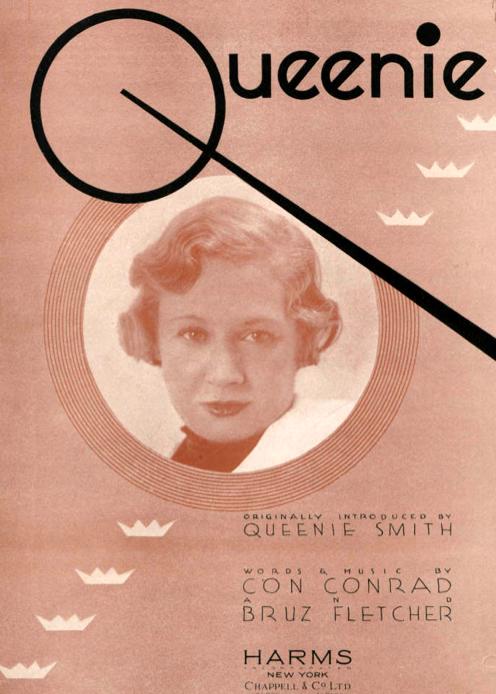 | ||||||||||
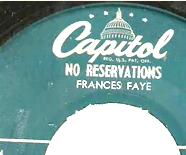 | ||||||||||
 | Attributed to Queenie See botom of pic! | |||||||||
 | ||||||||||
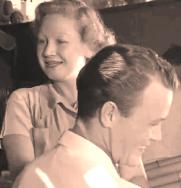 | ||||||||||
Queenie Smith and Bruz Fletcher Details of a lost song below included in her 1933 Vaudeville / Nightclub act writen by Fletcher. He also wrote the play "Not a Saint" in which she starred. | ||||||||||
 | ||
 | ||
 | ||
 | ||
Audrey Morris wrote: "Drunk with love"! Seeing that song evoked a few memories, I had forgotten about it. It was indeed written by Bruz Fletcher (checked the sheet music this morning - copyright 1950, which surprised me - I would have guessed it qualified for a thirties "horny" song, sort of has that feel). I never heard of Bruz Fletcher, so I also checked Dr. C's tome "Hot From Harlem", just in case . . . not there. The cover of the sheet is graced by an enticing photo of Joyce Bryant. Remember her? She was appearing at the famed Chez Paree in Chicago around the time I first encountered that song. She was glamorous in the extreme in the days before manmade hair, false eyelashes and what have you got that you don't got. Then she became a nun. Go figure. At any rate, one of my first jobs as a piano "single" was at a place called Ciro's, same alleged ownership as The Chez Paree (I'll leave that to your imagination). It was a small, intimate room - a prime example of art deco. In those days there was almost always at least two pianists in residence. Baptism of fire for me - the other piano/vocalist was a lady named Lila (Something) - a diminutive version of Tallulah Bankhead but twice as feisty. I was, of course, in deep trouble - I lied when I told them I could sing, I had three numbers precariously under my belt. Fortunately, I had scads of Classic American Popular Songs in my head because I loved them so much, and being my own accompanist I could find my keys as I stumbled along. Lila was a seasoned entertainer (terrible pianist) who knew how to deal with an audience. "The Kid's A Dreamer", "Wise Guys", "Ace In The Hole" and the inevitable "Drunk With Love" were all at her fingertips (accent on the third sylable), particularly after 12AM. Her particular treatment of the latter began with "I'm drunk with love and my buttox aches" and she gradually worked up a frenzy until she reached the line (forbidden on this list) , "GOD DX@M IT" with a great crashing blow to the top of the piano, drinks flying and considerable attention from those in attendance. Well - I loved Lila - and I do like the song. However, to this day I've never sung it, - but note: I did buy the sheet music, perhaps hoping that some day I would let 'er rip. Never happened. Mama gracefully looked the other way when my career took this unexpected turn - she whittled down her oft heard plaint, "What will the neighbors think?" to about twice a day. She probably should be credited with my not learning the song, that would have been the last straw. | ||||||
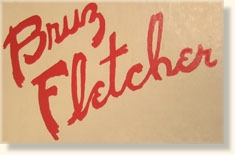 | ||||||
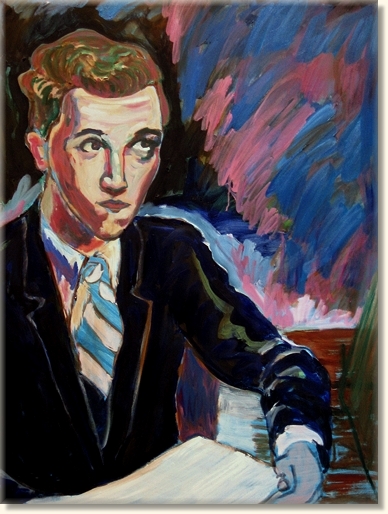 | ||||||
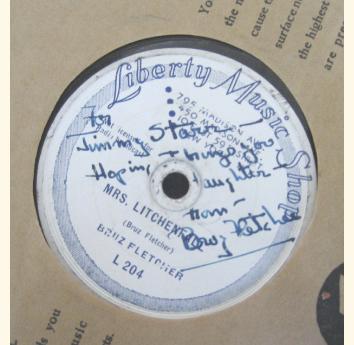 | 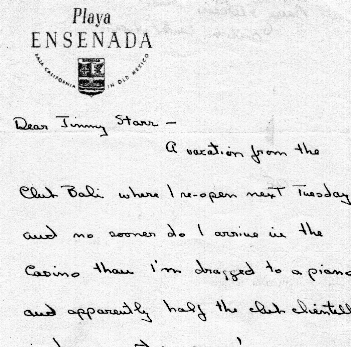 | |||
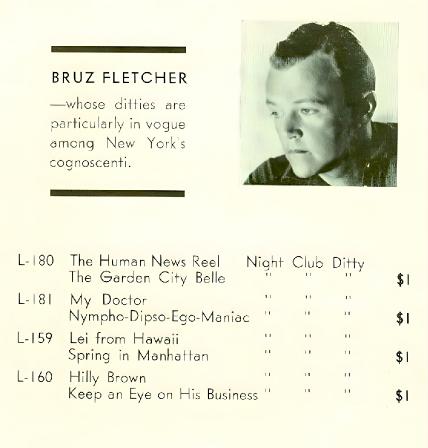 | |||||
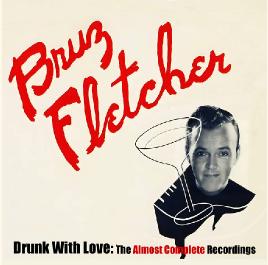 | |||||
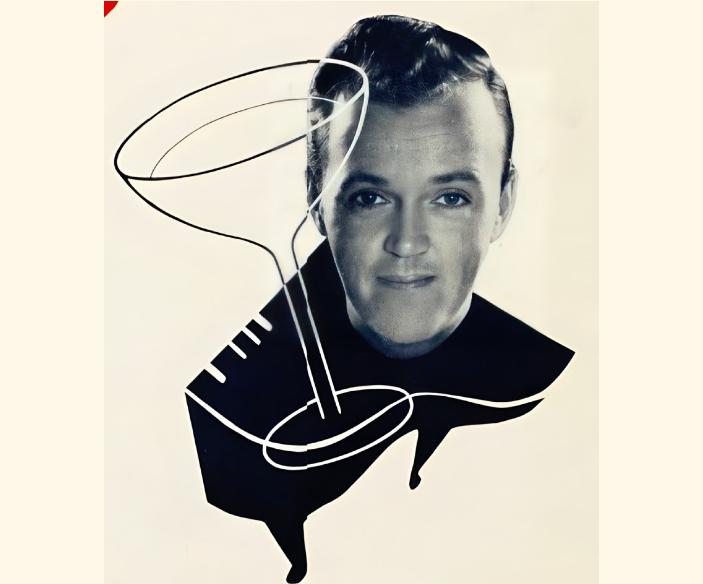 | ||
Site Continues: | ||
Bruz Fletcher: Camped, Tramped & A Riotous Vamp
is almost 200 pages containing the fruits of 5 years of exhaustive research including: heaps of unpublished images, Bruz Fletcher's extended and fascinating biography and family, analysis and commentary of his work from both queer and straight perspectives, lyrics to 15 of his songs, contributions from family members, collectors, and fans, bibliography, research details and more. Buy it here. Interested past contributors to this site can receive a free collectors-only edition of the book with an additional 30 pages! | ||
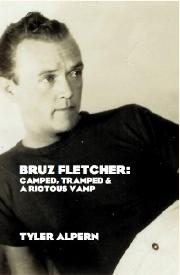 | ||